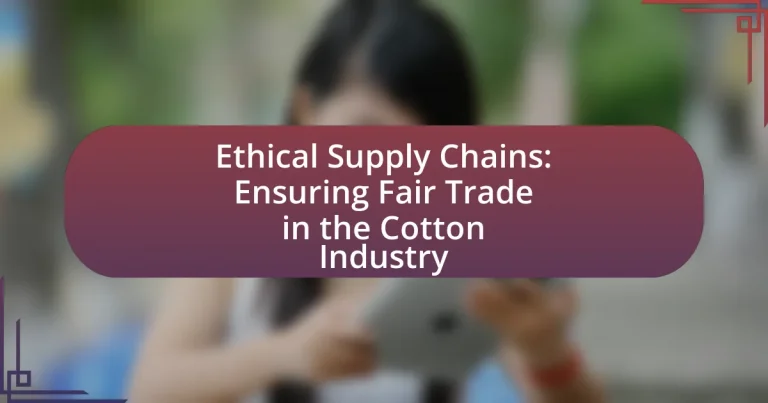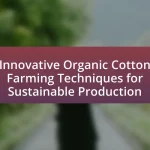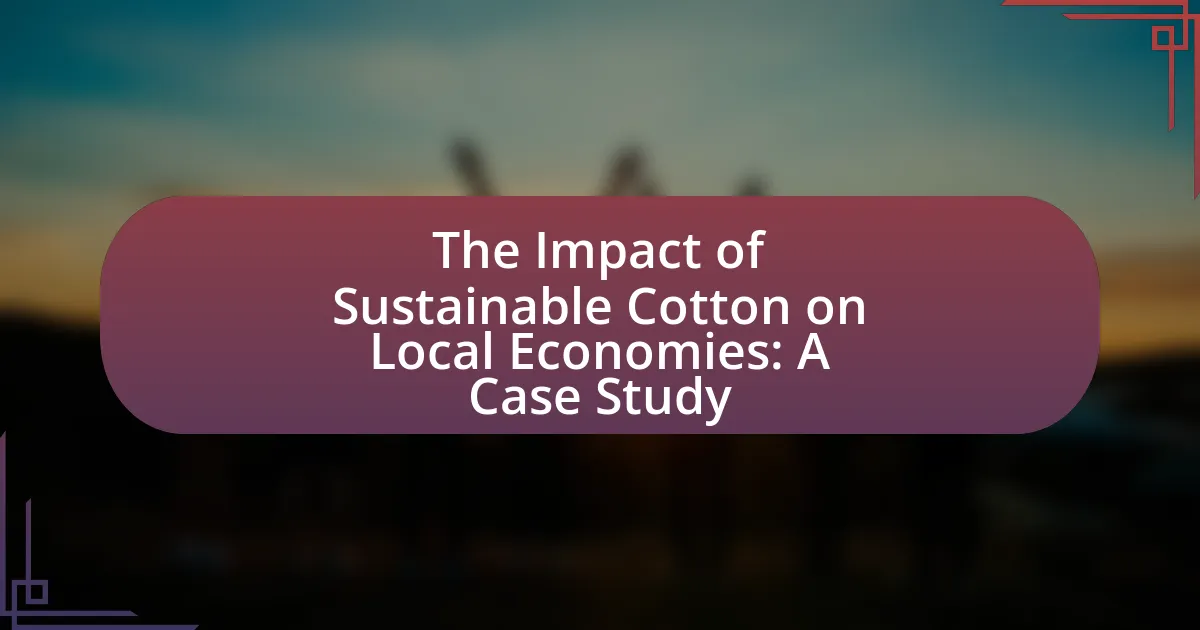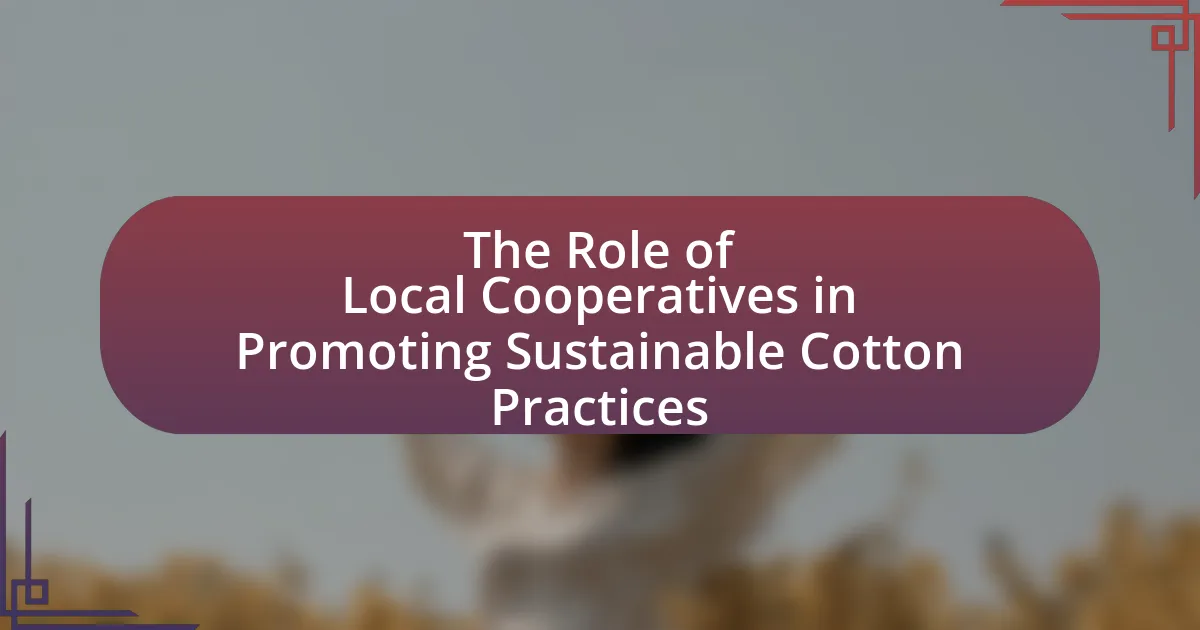Ethical supply chains in the cotton industry prioritize fair labor practices, environmental sustainability, and transparency, ensuring that cotton is sourced from farms that adhere to ethical standards. This article explores the differences between ethical and traditional supply chains, the principles that define ethical sourcing, and the role of fair trade in enhancing economic stability for farmers. It also addresses the challenges faced by ethical supply chains, including labor exploitation and environmental concerns, while highlighting the benefits for consumers and brands. Additionally, the article outlines best practices for implementing ethical supply chains and the importance of consumer education in promoting sustainable practices within the cotton industry.
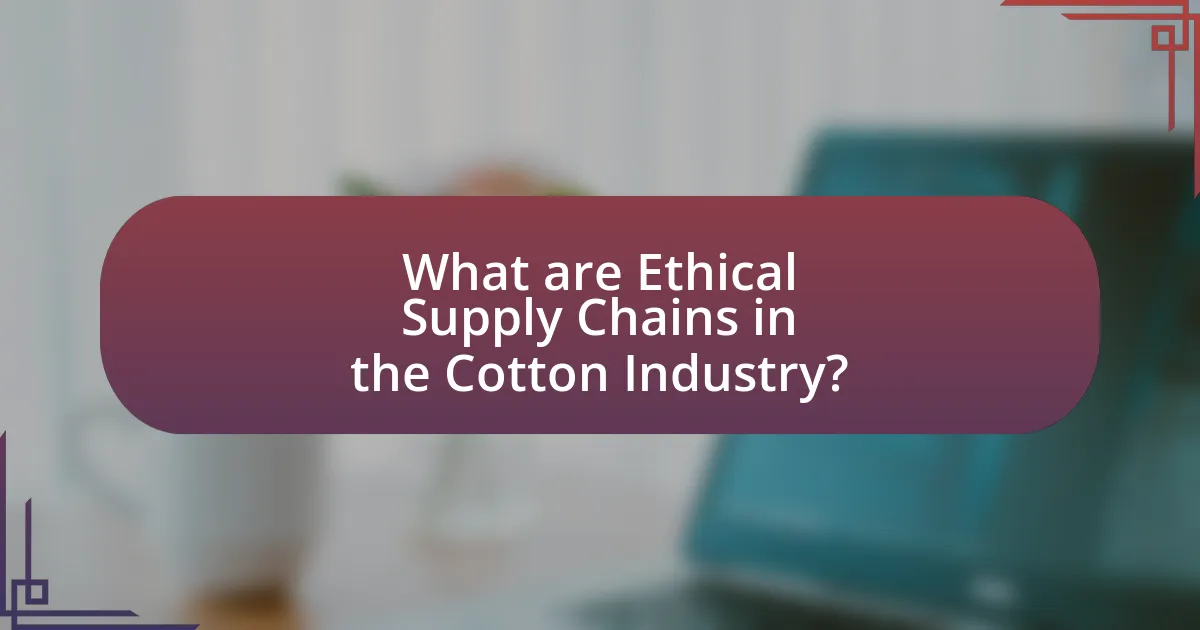
What are Ethical Supply Chains in the Cotton Industry?
Ethical supply chains in the cotton industry refer to systems that prioritize fair labor practices, environmental sustainability, and transparency throughout the production process. These supply chains ensure that cotton is sourced from farms that adhere to ethical standards, such as fair wages for workers, safe working conditions, and the absence of child labor. For instance, organizations like the Better Cotton Initiative promote sustainable farming practices and social responsibility, impacting millions of farmers globally. By implementing traceability measures, ethical supply chains enable consumers to verify the origins of cotton products, fostering accountability and encouraging responsible consumption.
How do Ethical Supply Chains differ from traditional supply chains?
Ethical supply chains prioritize social responsibility and environmental sustainability, contrasting with traditional supply chains that often focus primarily on cost efficiency and profit maximization. In ethical supply chains, companies ensure fair labor practices, such as fair wages and safe working conditions, which are often neglected in traditional models. For instance, the Fair Trade certification in the cotton industry mandates that producers adhere to specific labor and environmental standards, promoting equitable trade practices. This commitment to ethical standards not only enhances brand reputation but also meets the growing consumer demand for socially responsible products, as evidenced by a 2021 Nielsen report indicating that 66% of global consumers are willing to pay more for sustainable brands.
What principles define an ethical supply chain in cotton production?
An ethical supply chain in cotton production is defined by principles such as fair labor practices, environmental sustainability, transparency, and traceability. Fair labor practices ensure that workers receive fair wages, work in safe conditions, and are not subjected to child labor or forced labor, as highlighted by the International Labour Organization’s conventions. Environmental sustainability involves using farming methods that minimize harm to ecosystems, such as organic farming and reduced pesticide use, which are supported by studies showing lower environmental impact. Transparency and traceability require that all stages of the supply chain are documented and accessible, allowing consumers to verify the ethical standards of the cotton they purchase, as emphasized by initiatives like the Better Cotton Initiative. These principles collectively contribute to a responsible and ethical cotton supply chain.
Why is transparency important in ethical supply chains?
Transparency is crucial in ethical supply chains because it fosters accountability and trust among stakeholders. When companies openly share information about their sourcing practices, labor conditions, and environmental impact, they enable consumers and partners to make informed decisions. For instance, a study by the Ethical Trading Initiative found that transparency can lead to improved labor practices and reduced exploitation in supply chains, particularly in industries like cotton, where unethical practices are prevalent. This openness not only enhances brand reputation but also encourages compliance with ethical standards, ultimately contributing to fair trade and sustainable practices.
What role does fair trade play in ethical supply chains?
Fair trade plays a crucial role in ethical supply chains by ensuring that producers receive fair compensation and work under safe conditions. This approach promotes transparency and accountability, which are essential for building trust between consumers and producers. For instance, fair trade standards often require that a minimum price is paid to farmers, which helps protect them from market fluctuations and exploitation. According to the Fair Trade International report, farmers in fair trade certified cooperatives earn up to 50% more than those in conventional supply chains, demonstrating the tangible benefits of fair trade practices.
How does fair trade certification impact cotton farmers?
Fair trade certification positively impacts cotton farmers by ensuring they receive fair prices for their products, which enhances their economic stability. This certification mandates a minimum price that covers the cost of sustainable production, providing farmers with a reliable income. For instance, a study by the Fair Trade Foundation found that certified farmers earn up to 30% more than their non-certified counterparts, allowing them to invest in better farming practices and community development. Additionally, fair trade practices promote access to credit and training, further empowering farmers to improve their livelihoods and working conditions.
What are the benefits of fair trade for consumers?
Fair trade provides consumers with ethically sourced products that support sustainable practices and fair wages for producers. By choosing fair trade items, consumers contribute to improved living conditions for farmers and workers, ensuring they receive a fair price for their goods. Additionally, fair trade products often adhere to higher environmental standards, promoting sustainable agriculture and reducing the ecological footprint. Research indicates that fair trade can lead to a 20% increase in income for farmers, enhancing their economic stability and community development. This not only benefits the producers but also allows consumers to make informed choices that align with their values regarding social justice and environmental responsibility.
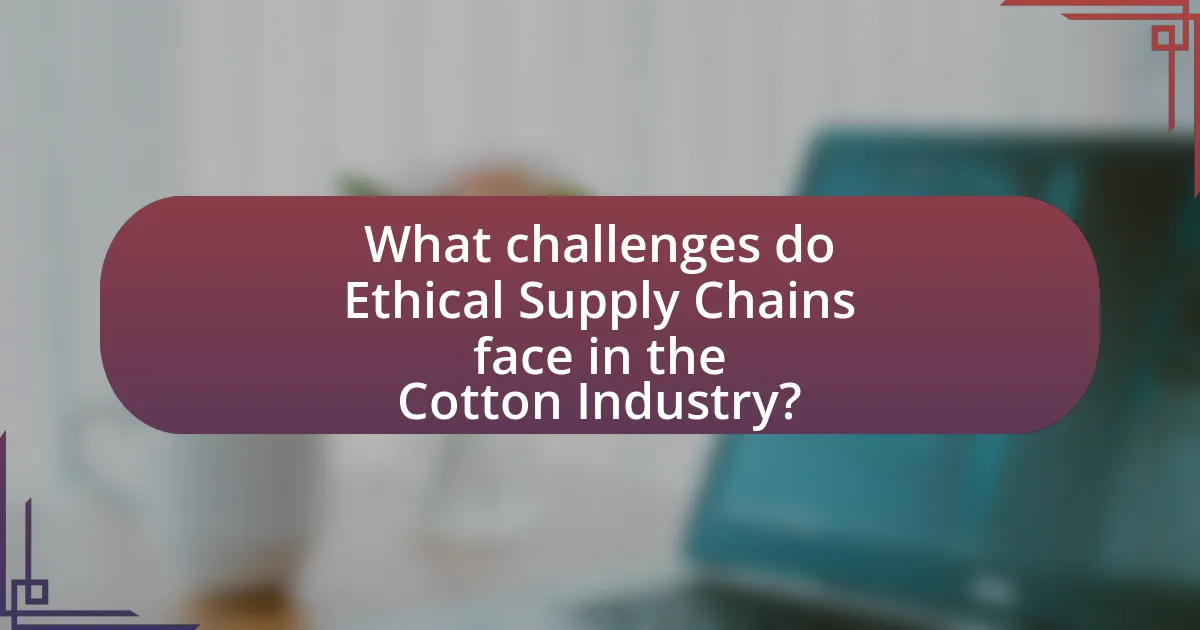
What challenges do Ethical Supply Chains face in the Cotton Industry?
Ethical supply chains in the cotton industry face significant challenges, including labor exploitation, environmental degradation, and traceability issues. Labor exploitation is prevalent, with reports indicating that millions of workers, particularly in developing countries, endure poor working conditions and low wages. Environmental degradation arises from unsustainable farming practices, leading to soil depletion and water scarcity. Traceability issues complicate the verification of ethical practices, as the complex supply chain often obscures the origins of cotton, making it difficult for companies to ensure compliance with ethical standards. These challenges hinder the effectiveness of ethical supply chains in promoting fair trade within the cotton industry.
What are the common issues affecting ethical sourcing of cotton?
Common issues affecting ethical sourcing of cotton include labor exploitation, environmental degradation, and lack of transparency in supply chains. Labor exploitation is prevalent, with reports indicating that millions of cotton workers, particularly in countries like Uzbekistan and India, face poor working conditions and low wages. Environmental degradation arises from the excessive use of pesticides and water in cotton farming, contributing to soil depletion and water scarcity. Additionally, the lack of transparency in supply chains makes it difficult for consumers and companies to verify the ethical practices of cotton producers, leading to challenges in ensuring fair trade.
How do labor practices impact the ethicality of cotton supply chains?
Labor practices significantly impact the ethicality of cotton supply chains by determining the conditions under which cotton is produced. Poor labor practices, such as child labor, forced labor, and inadequate wages, undermine ethical standards and violate human rights, leading to exploitation of workers. For instance, the International Labour Organization estimates that 170 million children are engaged in child labor globally, with a substantial portion in agriculture, including cotton production. This exploitation not only harms individuals but also tarnishes the reputation of brands associated with unethical practices, affecting consumer trust and market viability. Thus, ethical labor practices are essential for ensuring fair trade and sustainability in the cotton industry.
What environmental concerns are associated with cotton production?
Cotton production is associated with several significant environmental concerns, including high water usage, pesticide application, and soil degradation. The cultivation of cotton requires approximately 7,000 liters of water to produce just one kilogram of cotton, leading to water scarcity in regions where it is grown. Additionally, conventional cotton farming often relies on harmful pesticides and fertilizers, which can contaminate local water supplies and harm biodiversity. Soil degradation occurs due to monoculture practices, which diminish soil health and fertility over time. These factors collectively contribute to the environmental impact of cotton production, highlighting the need for sustainable practices in the industry.
How can stakeholders address these challenges?
Stakeholders can address challenges in ethical supply chains within the cotton industry by implementing transparent sourcing practices and engaging in fair trade certification. Transparent sourcing allows stakeholders to trace the origin of cotton, ensuring that it is produced under ethical conditions. Fair trade certification, which requires compliance with specific labor and environmental standards, helps guarantee that farmers receive fair compensation and work in safe conditions. According to the World Fair Organization, fair trade practices have been shown to increase farmers’ incomes by an average of 20%, thereby improving their livelihoods and promoting sustainable agricultural practices.
What strategies can brands implement to ensure ethical sourcing?
Brands can implement several strategies to ensure ethical sourcing, including establishing transparent supply chains, conducting regular audits, and collaborating with third-party certification organizations. Transparent supply chains allow brands to trace the origin of their materials, ensuring that they are sourced from ethical suppliers. Regular audits help identify and rectify any unethical practices within the supply chain, while collaboration with organizations like Fair Trade or the Global Organic Textile Standard provides credibility and assurance that sourcing practices meet ethical standards. These strategies collectively promote accountability and foster trust among consumers, ultimately contributing to a more sustainable cotton industry.
How can consumers influence ethical practices in the cotton industry?
Consumers can influence ethical practices in the cotton industry by making informed purchasing decisions that prioritize sustainably sourced and ethically produced cotton. When consumers choose to buy products certified by organizations such as the Global Organic Textile Standard (GOTS) or the Better Cotton Initiative (BCI), they signal to manufacturers and retailers the importance of ethical sourcing. According to a 2021 report by the World Wildlife Fund, consumer demand for sustainable products has led to a 30% increase in the market for organic cotton over the past five years, demonstrating that consumer choices can drive industry standards and practices.
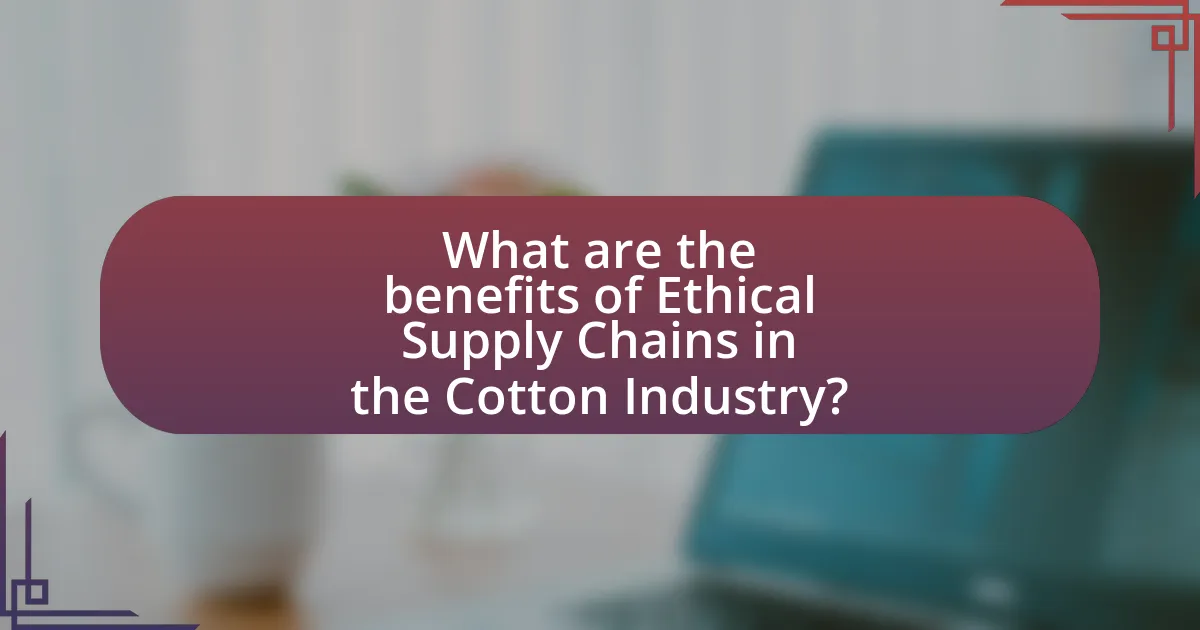
What are the benefits of Ethical Supply Chains in the Cotton Industry?
Ethical supply chains in the cotton industry provide several benefits, including improved labor conditions, environmental sustainability, and enhanced brand reputation. Improved labor conditions arise from fair wages and safe working environments, which are mandated by ethical sourcing practices. For instance, the Better Cotton Initiative promotes sustainable cotton production, ensuring that farmers receive fair compensation and work under safe conditions. Environmental sustainability is achieved through practices that reduce pesticide use and promote biodiversity, contributing to healthier ecosystems. Additionally, brands that adopt ethical supply chains often experience enhanced reputation and customer loyalty, as consumers increasingly prefer products that align with their values regarding social responsibility and environmental stewardship. This shift is supported by research indicating that 66% of global consumers are willing to pay more for sustainable brands, highlighting the market advantage of ethical practices in the cotton industry.
How do ethical supply chains contribute to sustainable development?
Ethical supply chains contribute to sustainable development by promoting fair labor practices, reducing environmental impact, and fostering economic growth in local communities. These supply chains ensure that workers receive fair wages and safe working conditions, which enhances social equity and improves quality of life. For instance, the Fair Trade certification in the cotton industry mandates that farmers receive a minimum price for their crops, which stabilizes their income and supports community development projects. Additionally, ethical supply chains often prioritize sustainable farming practices that minimize pesticide use and conserve water, thereby protecting ecosystems. Research indicates that companies adopting ethical supply chain practices can reduce their carbon footprint by up to 30%, demonstrating a direct link between ethical sourcing and environmental sustainability.
What economic advantages do ethical practices offer to farmers?
Ethical practices offer farmers increased profitability through higher market prices and improved access to premium markets. By adhering to fair trade standards, farmers can command better prices for their cotton, as consumers are willing to pay more for ethically sourced products. For instance, a study by the International Labour Organization found that fair trade cotton farmers received up to 30% higher prices compared to conventional cotton farmers. Additionally, ethical practices can lead to reduced costs associated with labor disputes and improved relationships with buyers, further enhancing economic stability for farmers.
How do ethical supply chains enhance brand reputation?
Ethical supply chains enhance brand reputation by demonstrating a commitment to social responsibility and sustainability. Companies that prioritize ethical sourcing practices, such as fair labor conditions and environmentally friendly processes, build trust with consumers who increasingly value corporate ethics. According to a 2021 Nielsen report, 73% of global consumers are willing to change their consumption habits to reduce environmental impact, indicating that ethical supply chains can significantly influence purchasing decisions and brand loyalty. Furthermore, brands that are transparent about their supply chain practices often experience positive media coverage and customer advocacy, further solidifying their reputation in the marketplace.
What impact do ethical supply chains have on consumer choices?
Ethical supply chains significantly influence consumer choices by increasing the likelihood of purchasing decisions that prioritize sustainability and social responsibility. Consumers are increasingly aware of the ethical implications of their purchases, leading to a preference for brands that demonstrate transparency and fair labor practices. Research indicates that 66% of global consumers are willing to pay more for sustainable brands, highlighting a direct correlation between ethical supply chains and consumer purchasing behavior. This trend is particularly evident in industries like cotton, where ethical sourcing practices can enhance brand loyalty and attract a conscientious customer base.
How can consumers identify ethically sourced cotton products?
Consumers can identify ethically sourced cotton products by looking for certifications such as Global Organic Textile Standard (GOTS) or Fair Trade Certified labels. These certifications ensure that the cotton is produced under environmentally and socially responsible conditions. For instance, GOTS requires compliance with strict environmental criteria and social criteria, including fair wages and safe working conditions. Additionally, consumers can research brands that transparently share their supply chain practices and sourcing information, as companies committed to ethical sourcing often provide detailed accounts of their production processes and labor practices.
What role does consumer education play in promoting ethical supply chains?
Consumer education plays a crucial role in promoting ethical supply chains by empowering individuals to make informed purchasing decisions that prioritize sustainability and fairness. When consumers are educated about the origins of products, labor practices, and environmental impacts, they are more likely to support brands that adhere to ethical standards. For instance, a study by the Ethical Trading Initiative found that informed consumers can drive demand for ethically produced goods, leading companies to adopt better practices. This shift not only enhances transparency in the supply chain but also encourages businesses to prioritize ethical sourcing, ultimately fostering a more equitable cotton industry.
What are best practices for implementing Ethical Supply Chains in the Cotton Industry?
Best practices for implementing ethical supply chains in the cotton industry include ensuring transparency, engaging with local communities, and adhering to fair labor standards. Transparency involves tracking the cotton from farm to finished product, allowing consumers to verify ethical sourcing. Engaging with local communities ensures that farmers receive fair compensation and support for sustainable practices. Adhering to fair labor standards, such as those outlined by the International Labour Organization, helps prevent exploitation and promotes safe working conditions. These practices collectively contribute to a more responsible and ethical cotton supply chain.
How can companies effectively monitor their supply chains for ethical compliance?
Companies can effectively monitor their supply chains for ethical compliance by implementing a combination of technology, regular audits, and supplier engagement. Utilizing blockchain technology allows for transparent tracking of materials from origin to end product, ensuring that ethical standards are maintained throughout the supply chain. Regular audits, both announced and unannounced, help verify compliance with ethical practices, such as fair labor conditions and environmental sustainability. Engaging suppliers through training and collaboration fosters a culture of accountability and ethical responsibility. According to a report by the Ethical Trading Initiative, companies that actively engage with their suppliers see a 30% improvement in compliance rates.
What partnerships can enhance the effectiveness of ethical supply chains?
Collaborations between brands, non-governmental organizations (NGOs), and local communities can significantly enhance the effectiveness of ethical supply chains. Brands partnering with NGOs can leverage expertise in sustainable practices and social responsibility, while local communities provide insights into cultural and economic contexts, ensuring fair trade practices. For instance, the Better Cotton Initiative collaborates with various stakeholders to promote sustainable cotton production, demonstrating how multi-faceted partnerships can lead to improved labor conditions and environmental sustainability in the cotton industry.
